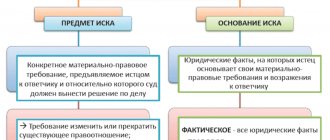Registration at the place of residence (propiska) is established by law to make it easier for government agencies to control the number of residents in populated areas. Therefore, even a small child must have a registration. Without it, parents will not be able to enroll him in kindergarten, school, receive benefits, payments and products from the dairy kitchen.
I would like to clarify right away that the concept of “registration” is a relic of Soviet times. There is no such term in Russian legislation, but in practice it is widely used. Therefore, it will be used further in the text.
So, in our article we will look at the specifics of registering a child after a divorce and how to register children without the consent of the father.
Peculiarities of registration of children in case of divorce of parents
If the child’s mother and father file for divorce, they must determine with whom the children will live:
- If they come to a common opinion, then the agreement on the residence of the children must be attached to the divorce claim.
- If they have not reached a common decision, then one of them can file an application with the court to determine the child’s place of residence or the order of communication with him.
Most often, the courts determine the place of residence of the child with his mother. That is, the child must be registered at the place of registration.
To change registration, a child can only be discharged together with a parent. If he was registered with his father, then they will have to be deregistered together.
Note! Children are not discharged “to nowhere.” The parent must provide the child's new registered address.
In an agreement or in a claim to determine the order of communication, you can indicate the condition that the child’s registration can be changed only with the consent of the father.
As soon as the court decision comes into force, this clause will become mandatory. If the mother does not comply with it, then she is considered to be violating the parental rights of the father. In this case, he can go to court and ask to determine the child’s place of residence with him.
How does the registration procedure work?
To minimize risks and difficulties, after the need arises to register a child together with his parents in the same living space, the latter will have to adhere to the following sequence of actions:
- First of all, after the birth of the baby, you will need to receive documentary evidence of the fact of his birth and parental obligations.
- The second step is collecting the documents that are necessary for the authorized service.
- The third stage involves filling out the appropriate application. The form and template for drawing up are available at the Migration Department. They can also be obtained from specialized sites. Still, it is recommended to use the official option and submit a request directly to the service department. There you can request advice on unclear issues.
- All that remains is to bring the required documents to the department of the Main Directorate for Migration of the Ministry of Internal Affairs of the Russian Federation and wait for the decision of the employees.
Usually, no claims from authorized persons arise, but if they are identified, it is necessary to obtain information about the detected deficiencies as quickly as possible, correct the violations and submit the application again.
Misconceptions about registering a child when parents divorce
The issue of registering children at their place of residence has become surrounded by a number of myths. I propose to consider the most popular of them:
- The mother and father must give consent for discharge. It is not true. If the parents did not provide for such a condition during the divorce, then the child can be discharged together with one of the parents. Moreover, when registering a child, even the presence of a second parent is not required.
- To be discharged, you must obtain the consent of the guardianship department. This is also not true. The guardianship department agrees to deregister children who are under guardianship or in a foster family. A mother or father can discharge a natural child without the consent of the guardian.
- If parents sell the apartment in which the child is registered, then they are obliged to provide him with other housing that is no worse or better. And that's not true. If the child does not own the apartment, then the parents can sell their home and buy a smaller one or a cheaper one.
If one of the owners is against
Often from practice you can see how when spouses divorce and try to register children, fathers do not give their permission to this procedure. In connection with these events, many are interested in the question of whether the consent of one of the owners is necessary for the registration of a newborn? According to the law, you can register your child on the territory of your parents without the consent of the owner of the property.
The resolution is supported by the following laws:
- The Civil Code of the Russian Federation, which states that the baby is obliged to live on the territory of his parents. If the spouses are divorced, then the children live with one of the legal representatives.
- The Housing Code of the Russian Federation gives the right to register young children without the intervention of the owner of the property.
- The Criminal Code of the Russian Federation provides for punishment in the form of imprisonment for invalid registration.
- The Code of Administrative Offenses provides for fines for failure to obtain registration within the specified time frame.
As we have already found out, registration of a minor child without the consent of the owner is possible, but you need to decide on the grounds. There are only two of them:
- Declaratory order.
- Place of attachment.
You will also need to collect all the necessary documentation in advance in order to quickly and easily register a new tenant. It is also possible for a mother to register with her child without the consent of the owner.
General rules for registering a child
Until the child has reached the age of 14, his place of residence is considered to be the place of registration of the mother or father (Article 20 of the Civil Code of the Russian Federation). Therefore, one of the parents must register the child at their place of registration.
In this matter, the law does not establish the priority of the mother or father. Any of them can register a child.
But a parent can register children at their place of residence if it is included in the birth record. If a child was born out of wedlock and paternity has not been established, then the father cannot register him with him.
Registration must be done within 7 days. If the family has moved to a new place of residence, then the period is calculated from the moment of arrival at the destination.
The law does not establish special deadlines for the registration of newborns. Therefore, the mother or father must register it within 7 days from the date of birth registration.
If the parents did not register the child in a timely manner, then when contacting the passport office, the specialist will issue a fine in the amount of 2,000 to 3,000 rubles. (Article 19.15.2 of the Code of Administrative Offenses of the Russian Federation).
Previously, a registration stamp was placed on a child’s birth certificate. In 2021, registration is confirmed by a certificate of registration of the child at the place of residence. It is drawn up in accordance with Form No. 8 of Order No. 984 of the Ministry of Internal Affairs of Russia dated December 31, 2017.
About timing and cost
It very rarely happens that a newborn or a minor is registered on the day the application is submitted, since usually you have to wait several days for a decision from the migration service. The processing time for an application depends on various circumstances. For example, if you submit a request through the Main Directorate of Migration Issues or the Migration Service, you need to wait about three days. If you contact the Multifunctional Center, the procedure will take from five to seven days. When submitting an electronic request through the government services website, the waiting time for a response is up to nine days.
You can ask for urgent registration only when submitting a request through the Main Directorate, providing there compelling reasons for this. If responsible employees meet the citizen halfway, registration can
be issued immediately on the day of application.
For citizens of the Russian Federation, the registration procedure is completely free. However, if registration is needed urgently, you will still have to pay a state fee. Each region has its own norm, but, as a rule, the amount fluctuates around three hundred rubles. For citizens of foreign countries, registration will be paid.
How to register a child aged 0 to 14 years in an apartment
As has already been said, the child cannot be discharged “to nowhere.” Therefore, the best option would be simultaneous registration and discharge. To do this, you need to contact the department of the Ministry of Internal Affairs at the place of new registration.
Parents do not need to obtain the consent of the apartment owner to register their child.
If the mother and father were not married at the time of the child’s birth, then the child can be registered in the father’s apartment only together with the mother.
Note! It will not be possible to obtain a child’s registration on the same day.
Algorithm for registering a child:
- Gather your documents.
- Complete the application.
- Visit the Migration Service office of the Ministry of Internal Affairs.
- Receive a certificate of registration.
Let's look at each stage in more detail.
Collect documents
Clauses 48, 50 of the Order of the Ministry of Internal Affairs of Russia dated December 31, 2017 No. 984 establish an exhaustive list of documents for registration:
- statement from mother or father;
- birth certificate;
- passport of the applicant parent.
Documents must be provided in originals. The passport office specialists will not accept copies.
Fill out the application
You can fill out the application:
- In person at the passport office. The Ministry of Internal Affairs website will help you find a department. During the visit, the specialist will issue an application form in Form No. 6, established by Order of the Ministry of Internal Affairs of Russia dated December 31, 2017 No. 984. The parent who fills out the application for the child must indicate his data and passport details. The application is considered within 7 days.
- Through State Services. When submitting an application, the service itself will insert the parent’s data from the profile. If the children's data is entered into the profile, then the parent will be able to substitute them himself. After which the application will be generated and all you have to do is click on the “Submit Application” button. Your profile must have a verified phone number and email address. The application is considered within 8 days.
- Through MFC. To submit an application, you need to contact any branch of the MFC in the city where registration is processed. The application is processed within 8-9 days.
Visit the Ministry of Internal Affairs
On the appointed day, the applicant must visit the Ministry of Internal Affairs office or the passport office. You must have a receipt with you.
If the application was submitted through State Services, the service will notify the applicant about the day the documents will be received.
Receive a certificate of registration
When registering a child at the place of residence, parents are given a separate document. A registration stamp is not placed on the parents’ passports or on the child’s birth certificate.
If parents lose their child's registration certificate, they can obtain a duplicate. To do this, you need to personally contact the passport office with an application. You need to have your passport and child’s birth certificate with you.
The new certificate will have the details of the lost one. But the form will have a “Duplicate” stamp in the corner.
Where to contact?
Having answered the question whether it is possible to register a child without the consent of the owner and other registered residents, you should also pay attention to the fact that there are several options for submitting an application and documents for registering a newborn or minor:
- Personal visit to the territorial migration service at your place of residence. The presence of the owner of the home is not necessary; a parent or guardian who has a stamp in their passport or a certificate with registration at the same address where the child needs to be registered is sufficient;
- Personal appeal to the Multifunctional Center. The procedure and requirements are exactly the same as in the migration service, with the only difference being that the procedure will take a little longer;
- Personal visit to the migration department of the Ministry of Internal Affairs;
- Sending a request through the Russian Post Office. All attachments must be notarized copies. Originals cannot be sent;
- Submitting an electronic request using the official government services portal. Registration on the site itself is required. Further operations through the user’s personal account.
The choice of method of submitting the application and documents does not in any way affect the procedure itself.
How to register a child aged 14 to 18 years
If the child has reached 14 years of age, the registration situation changes. From the age of 14 he himself must:
- be present at the passport office;
- fill out an application;
- pick up documents.
And in order to apply for registration through State Services, the personal account must be registered in the name of the child.
But he retains the right to registration in the residential premises in which one of the parents is registered. And the consent of the homeowner is not required for this.
Separately, it is worth considering the situation when a child over the age of 16 has undergone the emancipation procedure. This is the acquisition of civil rights and responsibilities in full, on an equal basis with adult citizens. a child aged 16 to 18 years can undergo the emancipation procedure if he works under an employment contract, carries out entrepreneurial activities or is married.
To be recognized as emancipated with the consent of the parents, the child must contact the guardianship department at the place of permanent registration. And if the mother and father are against it, then to the district court at the place of registration.
Although after emancipation the child receives the full range of civil rights and responsibilities, he retains his right to register with his parent. Since the passport office does not add information about emancipation, there will be no problems with registration.
An emancipated child can be discharged from the apartment without the consent of the parents and without their participation in the procedure. To do this, he must provide the passport office with an order from the guardianship department or a court decision on emancipation.
Is it possible to register a teenager temporarily?
If the owner of the property decides to register a newborn child temporarily, he must know his rights. Many are afraid to register children on a temporary basis because they are afraid of the consequences. But the owners face no threat for such a procedure. The owner does not have to worry about his well-being, since the new tenant does not have any rights to the property in which he will live. Property management can be managed from:
- inheritance orders;
- a circular drawn up with the consent of the two parties to draw up a deed of sale and purchase;
- deed of gift;
- court order.
To register a new resident, it is necessary to provide the relevant authorities with an extract from the previous place of residence, since you can only register in one place, and you will not be able to go through this procedure a second time.
Registration allows residents to live in the specified territory and use any property on the same basis as other residents in this residential premises. Thanks to registration, you can get a job and choose a childcare facility for your child.
Important! Registration tends to cancel itself upon expiration of the registration period. If the legal representative’s period of residence in the residential premises where they were previously registered expires, then the teenager no longer has such rights.
When registering your baby on a temporary basis, you need to clearly understand that when drawing up an agreement with the owner, a time frame should be indicated. Without specifying a deadline for registration, it will be considered unlimited.
Legal issues
How to change a child's registration after a divorce?
During a divorce, there is a situation where the child and his mother are registered with the father, but the man demands his ex-wife to leave the apartment.
If a woman agrees to change her place of registration and move out with her child, then she needs to: - decide where the new registration will be; — deregister mother and child at the same time; — register and register the child no later than 7 days from the date of deregistration.
If the child remains to live with his father, then there is no need to remove him from the register.
Do I need to confirm my child’s citizenship when changing registration?
When registering a child, the passport office may request citizenship documents.
This confirmation depends on the age of the child. Previously, the passport office issued a special form that confirmed citizenship. Then they put a mark on the birth certificate. Currently, such marks are not provided. If the birth certificate indicates that the parents are citizens of the Russian Federation, then additional confirmation of citizenship is not needed.
If the child has reached 14 years of age, then his citizenship is confirmed by a passport.
How to obtain temporary registration of a child when parents divorce?
To obtain temporary registration for a child, you do not need to obtain the consent of the second parent.
Therefore, the parent with whom the child lives has no choice but to submit his documents for temporary registration. Note! Registration of temporary registration does not entail a change in registration at the place of residence.
What are the benefits of registering a child in the father’s apartment after a divorce?
Consider the situation: mother and father divorced.
They decided that the child would live with his mother. But after the divorce, the child remained registered in his father’s apartment. I would like to clarify right away that this does not mean that registration is not synonymous with property rights. The child has no rights to the apartment.
He simply retains the right to reside in it. But the child retains the right to live in the father’s apartment even if he is registered in another place.
What does registering a child in the father’s apartment provide:
— parents can put their child on the waiting list for a municipal kindergarten at the place of registration; — parents can get a place in the school at their place of registration; - only the father can apply for benefits and allowances for the child.
Does the mother have the right to live at the place of registration of the child after a divorce?
This question cannot be answered unambiguously.
Let's consider the options: 1. The children are registered with their father and live with him. In this case, the mother cannot move into the apartment without the consent of the owner. 2. The children are registered with their father, and the apartment is municipal. In this situation, the consent of the father of the children to move in is not enough. It is necessary to obtain consent from all citizens who are registered in this apartment, even if they do not actually live in it. In addition, the consent of the municipality must be obtained. 3. The child is the owner of the apartment in which he is registered. In this case, the mother has the right to move into the apartment to live with the child. To do this, parents must decide that the children remain with the mother. And if agreement on this issue is not reached, the mother can move in only on the basis of a court decision.
Is it possible to register a child under 14 years of age with their grandmother?
A child under 14 years of age can only be registered with a grandmother or any other place together with one of the parents. Even if the grandmother fully agrees that her grandson will be registered with her, the passport office will refuse registration.
Is the consent or permission of the father necessary for the child to register with the mother after a divorce?
If the parents or the court determine that the children live with their mother, then additional consent is not required.
On what grounds?
The basis for registering a newborn or a minor child under eighteen years of age are two points:
Dear readers!
Our articles talk about typical ways to resolve legal issues, but each case is unique. If you want to find out how to solve your specific problem, please contact the online consultant form on the right →
It's fast and free!
Or call us by phone (24/7):
If you want to find out how to solve your particular problem, call us by phone. It's fast and free!
+7 Moscow,
Moscow region
+7 Saint Petersburg,
Leningrad region
+7 Regions
(free call for all regions of Russia)
- Application for registration;
- A place to register and stay.
However, each of these points is associated with a certain number of actions. For example, simply submitting an application is not enough. It is necessary to prepare a certain package of documents for it, and this is often associated with trips to government agencies, especially when paper issues were not dealt with in a timely manner and now they need to be restored or obtained from scratch.
As you know, without registration it is almost impossible to place a child in a kindergarten, educational institution or register at a clinic. Many social benefits and subsidies are also becoming unavailable.
In the Civil Code of the Russian Federation, a person’s place of residence is recognized as the premises where he lives permanently or primarily. It does not matter who is the owner of this premises and what relationship the owner has with the registered person, since it can be a house or apartment rented out under a long-term lease agreement that has been formalized. At the same time, it is impossible to register a child separately from the parents of a minor, a newborn or his guardians.
Pre-trial preparation
Collection of documentation
What papers are needed to discharge a minor?
application for deregistration (written by the child himself if he has already reached fourteen years of age);
- general passport;
- departure sheet;
- metrics;
- documents for the apartment from which they are leaving (order; certificate of number of residents; social tenancy agreement; certificate of ownership);
- passport for a new home.
Application form for deregistration at the place of residence (form No. 6)
Sample of filling out an application for deregistration at the place of residence (form No. 6)
Departure sheet
Will be discharged within seven days.
However, if the boy or girl is not just registered, but the owner, then the “approval” of guardianship will also be required .
To register in a new place, you need:
- statement from a parent;
- documents for a new apartment;
- metrics;
- permission of the board of trustees (if the minor is the owner).
Sample application for registration of a child.
The little citizen will be registered in the new place within three days.
Application for guardianship
It will require the following documents (None of them should not only be expired, but even come close to it . Remember, the deadline for issuing an administrative document is a month. Officials don’t care whether the “expiration dates” of your certificates or pledges expire or not):
- application (from dad and mom or the child himself, if he is already 14 years old);
- request from a notary (if required);
- identity cards of all participants in the transaction;
- BTI certificates;
- extracts from the house register;
- cadastral plans for all apartments involved;
- certificate from the EIRTs about the absence of debt (if required);
- ownership documents for all premises involved in the transaction;
- copies of financial and personal accounts.
The date and signature are placed directly in the presence of the official.
The application is addressed to the head of the municipality.
The paper must indicate :
- details of the parent (full name, place of residence);
- request for permission to buy and sell;
- what apartment, what size does your son or daughter plan to register in after the transaction and on what rights;
- assurance that the interests of other persons involved in the sale will not be infringed;
- a phrase stating that you have no claims against the guardianship authority;
- date, signature.
Sample application for guardianship
What options exist: table
| According to the place of registration | |||
| № | A citizen who has property rights or other rights | Probability of registration | Base |
| Owned apartment/house | |||
| 1. | The owner, that is, the owner, is alone (he is the parent) wishing to register at this address | Maybe | based on the personal will of the mother/father; the consent of the 2nd spouse or other copyright holders is not required |
| 2. | There are several owners, one of them is the parent | ||
| 3. | There are several owners, but the mother, who is counting on registration, has no rights to home ownership | possible if a number of conditions are met | with the consent of each owner (in writing), except for residents under 18 years of age |
| 4. | There is only one owner, and the parent has no rights to the apartment | with the consent of the sole owner | |
| Social hiring | |||
| 1. | The responsible tenant, that is, the tenant, is a person who has close family ties in relation to the registered mother (husband or mother/father) | possible if a number of conditions are met | with the consent of the tenant exclusively, in this case the consent of the landlord is not required (the owner of the apartment is the state or organization); norms in terms of living space in this situation are not taken into account and are not considered a limitation |
| 2. | The employer is a relative of the mother, but not a close one | with the consent of each registered person; Footage standards are not taken into account | |
| 3. | The employer is an outsider who is not a relative of the registered mother | it is required to obtain the consent of each person registered, as well as the landlord; the living space standards provided for each citizen are taken into account; if the standards are violated, registration is impossible | |
Accordingly, registration is carried out based on the general requirements of registration, regardless of whether the child is registered in it.
| In the child's home | |||
| № | Number of owners | Probability of registration | Base |
| 1. | One owner, who is a child | possible if a number of conditions are met | with the consent of the guardianship or by court decision |
| 2. | Several owners, one of whom is a parent who wants to register | there is no need to obtain consent, the owner only needs to submit an application | |
| 3. | Several owners, one of them is an adult, the other is a child of a mother who wants to register | with the consent of the adult owner of the apartment | |
Can a father or mother register their child?
Unfortunately, registering as an adult is a little more difficult . In this case, it is necessary to obtain the consent of the owner of the living space and all residents. If there is no such agreement, then you can try to resolve the problem in court, although there is practically no chance of a successful outcome.
A controversial case arises if the child is not only registered on the father’s territory, but also owns part of the living space (say, as a result of the privatization of housing). Then the court may well satisfy the mother’s desire to live with the child on its territory without the consent of other residents.
True, this will depend on whether the minor’s place of residence is determined with his mother or father, and also whether this living space is the only possible place of residence for the mother. Surely the wishes of the child himself will be taken into account.
Where to apply to receive it?
It depends on where the child is registered:
- If you are in a private house, then it is most convenient to contact the MFC (and do not forget to take the house register!).
A specialist in the appropriate window will help you fill out all the necessary documents and transfer them to the authorities that are responsible for registration. - If the baby needs to be registered in the apartment, then it all depends on the way the house is managed, that is, whether you have an HOA, a housing cooperative or a management company.
These offices have a specialist of the relevant profile who is required by law to transfer your documents for registration to the relevant structures (clause 17 of the Regulations).
To submit documents, you must appear in person , but it is possible to save some time by submitting a registration application through the government services portal.
Video with detailed instructions on how to register a child through the state government portal:
This will not free you from the need to provide documents in paper form, but you will be able to discuss the time of appearance with the specialist who invited you and not spend half a day standing in queues.










